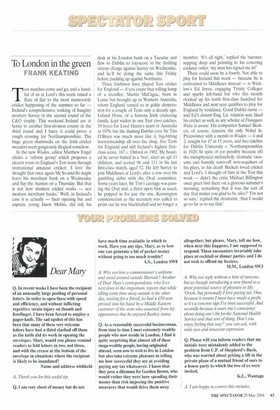To London in the green
FRANK KEATING
Test matches come and go, and a handful of us at Lord's this week raised a flute of fizz to the most memorable cricket happening of the summer so far — Ireland's comprehensive tonlcing of haughty strutters Surrey in the second round of the C&G trophy. This weekend Ireland are at home to another first-division county in the third round and I fancy it could prove a rough crossing for Northamptonshire. The huge green shamrocks on the Irish cricket sweaters seem gorgeously illogical somehow.
In the new Wisden, editor Matthew Engel chides a `reform group' which proposes a clearer route to England's Test team through recreational amateur cricket: 'I love the thought that once again Mr So-and-So might leave his merchant bank on a Wednesday and flay the Aussies on a Thursday. But that is not how modern cricket works — nor modern merchant banks.' Well, in Ireland's case it is actually — their opening bat and captain, young Jason Molins, did tidy his desk at his London bank on a Tuesday and flew to Dublin to top-score in the thrilling victory charge against Surrey on Wednesday, and he'll be doing the same this Friday before padding up against Northants.
Three Irishmen have played Test cricket for England — if you count that willing lump of a trundler, Martin McCague, born in Lame but brought up in Western Australia, whom England turned to in giddy desperation for a couple of Tests only a decade ago. Leland Hone, of a famous Irish cricketing family, kept wicket in one Test (two catches, 19 byes) for Lord Harris's team in Australia in 1878, but the dashing Dublin cove Sir Tim O'Brien was much more like it, big-hitting hooraymanship all over the shop, five Tests for England and still Ireland's highest firstclass score, 167 v. Oxford in 1902. He boasted he never batted in a 'box', sired an apt 11 children, and scored 90 and 111 in his last first-class match, aged 52. He left Surrey to join Middlesex at Lord's after a row over his gambling debts with the Oval committee. Some years later, Sir Tim's carriage was passing the Oval and, a thirst upon him as usual, he popped in for just the one. Kennington consternation as the secretary was called to point out he was blackballed and no longer a member. 'It's all right,' replied the baronet, supping deep and pointing to his cowering cockney ostler, `my man has signed me in!'
There could soon be a fourth. Not able to play for Ireland this week — because he is contracted to Middlesex instead — is Wicklow's Ed Joyce, engaging Trinity Colleger and sparky left-hand bat who this month clocked up his tenth first-class hundred for Middlesex and next year qualifies to play for England by residence. Good Dublin name — and Ed's distant Eng. Lit, relation sure liked his cricket as well, as any scholar of Finnegans Wake is aware. His compatriot Samuel Beckett, of course, remains the only Nobel lit. Prizewinner with a mensh in Wisden — 4 and 2, nought for 47 in 15 overs, and two catches for Dublin University v. Northamptonshire in 1926. In spite of (or possibly because of) the metaphysical melancholy, dramatic vacuums and barmily sawn-off non-sequiturs of his plays, to his death Beckett loved cricket and Lord's. I thought of him at the Test this week — didn't the critic Michael Billington once greet him there on a glorious summer's morning, remarking that it was the sort of day that makes you glad to be alive? 'I'm not so sure.' replied the dramatist, 'that I would go so far as to say that.'


































































 Previous page
Previous page